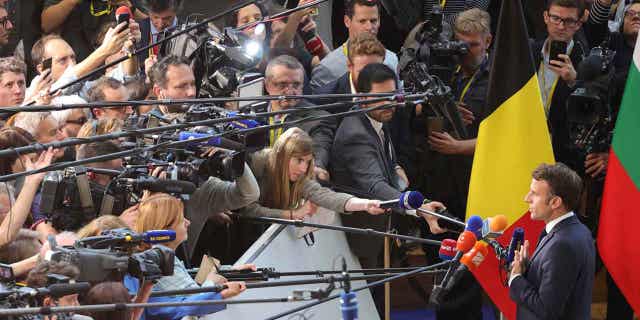On Thursday, EU leaders opened a two-day summit divided on whether and how the bloc could impose a gas price cap to contain the energy crisis fueled by the invasion of Ukraine by Russian President Vladimir Putin and the his strategy to stifle gas supplies to the bloc at will.
And, for once, the traditional EU pilot duo – Germany and France – were on opposite sides, with Germany expressing doubts and holding plans for maximum price at bay, while most others want to move forward. .
“Our role is to ensure that there is a European unity and that Germany is part of it,” said French President Emmanuel Macron. “It is not good for Germany or for Europe that it isolates itself. It is important that unanimity can be found on proposals that are the subject of broad consensus,” Macron said upon arrival at the summit.
German Chancellor Olaf Scholz said that any dispute is about the method, not the goal. German Chancellor Olaf Scholz said: “Gas, oil and coal prices have to go down, electricity prices have to go down, and this is something that requires a joint effort from all of us in Europe.”
The Netherlands also said they feared that if a price cap was set too high, supplies would simply sail from Europe and go elsewhere. “Everyone wants the price of gas to go down, but you want to make sure the gas imports keep coming in,” Prime Minister Rutte said.
EU ANNOUNCES TRAINING MISSION TO UKRAINE, $ 500 MILLION FOR WEAPONS
It laid the foundations for arduous negotiations that would be unlikely to be resolved by Friday afternoon, when the summit is due to conclude.
At the opening of the summit, Ukrainian President Volodymyr Zelenskyy highlighted the need for solid EU unity in dealing with Russia, which should address the 27 national leaders by videoconference from Kiev, asking for continued help to get his nation during the ‘winter.
Scholz said Zelenskyy shouldn’t have such worries. Reacting to Russian attacks on civilian infrastructure and spreading fear in cities with killer drones, Scholz said they were “war crimes”.
“Even these scorched-earth tactics will not help Russia win the war. They will only strengthen the resolve and resilience of Ukraine and its partners,” he told parliament in Berlin.
The upcoming cold season will also be at the heart of the EU headquarters, where leaders will ignite in what should be talks that will last into the night.

French President Emmanuel Macron speaks to the media as he arrives for an EU summit at the Council of the EU building in Brussels on 20 October 2022. European Union leaders are heading for a two-day summit with conflicting views on the possibility that the blockade could impose a maximum gas price cap to contain the energy crisis.
(Photo AP / Olivier Matthys)
Natural gas prices spiraled out of control over the summer as EU nations tried to outdo each other to replenish their reserves for the winter. Now EU leaders will seek to increasingly combine their gas purchases and perhaps set a temporary price cap to make sure an overheated energy market doesn’t come back to haunt them again.
Member States have already decided to reduce gas demand by 15% during the winter. They also pledged to fill gas storage facilities to at least 80% of capacity by November and, to reduce gas-powered electricity production, to reduce peak electricity demand by at least 5%.
The issue of possible EU gas price limits has steadily risen on the political agenda for months as the energy squeeze has tightened, with 15 countries like France and Italy pushing for such frank action.
ZELENSKYY TARGETS THE EU AT THE ENERGY SUMMIT AS LEADERS CONSIDER THE PRICE OF GAS
And while Angela Merkel was the reassuring voice who often brokered a compromise during her 16 years as German Chancellor, her successor Scholz is now at the center of a split in the bloc.
Germany and the Netherlands argue that market interventions such as excessive price limits could harm both the availability of natural gas and incentives for governments and consumers to save it.
According to diplomats, a plan for the EU to combine joint gas purchases and measures to improve solidarity with the EU nations most affected by the spiraling energy price should receive much more support.
Russia is increasingly relying on drone strikes against Ukraine’s energy grid and civilian infrastructure and wreaks havoc on Ukrainian cities, tactics that European Commission President Ursula von der Leyen has called “war crimes” and “pure terror” Wednesday.
Diplomats are already considering more sanctions to come. But the alleged friendliness of Hungarian Prime Minister Viktor Orban towards the Kremlin makes life more difficult. Even as previous EU sanctions against Russia were passed unanimously, it has become increasingly difficult to keep Orban on board by accepting exemptions.
CLICK HERE TO GET THE FOX NEWS APP
“The failed sanctions in Brussels are already an almost unbearable burden. We will urge a reconsideration of the war sanctions policy,” Orban wrote on Wednesday, throwing a political challenge to his colleagues.
